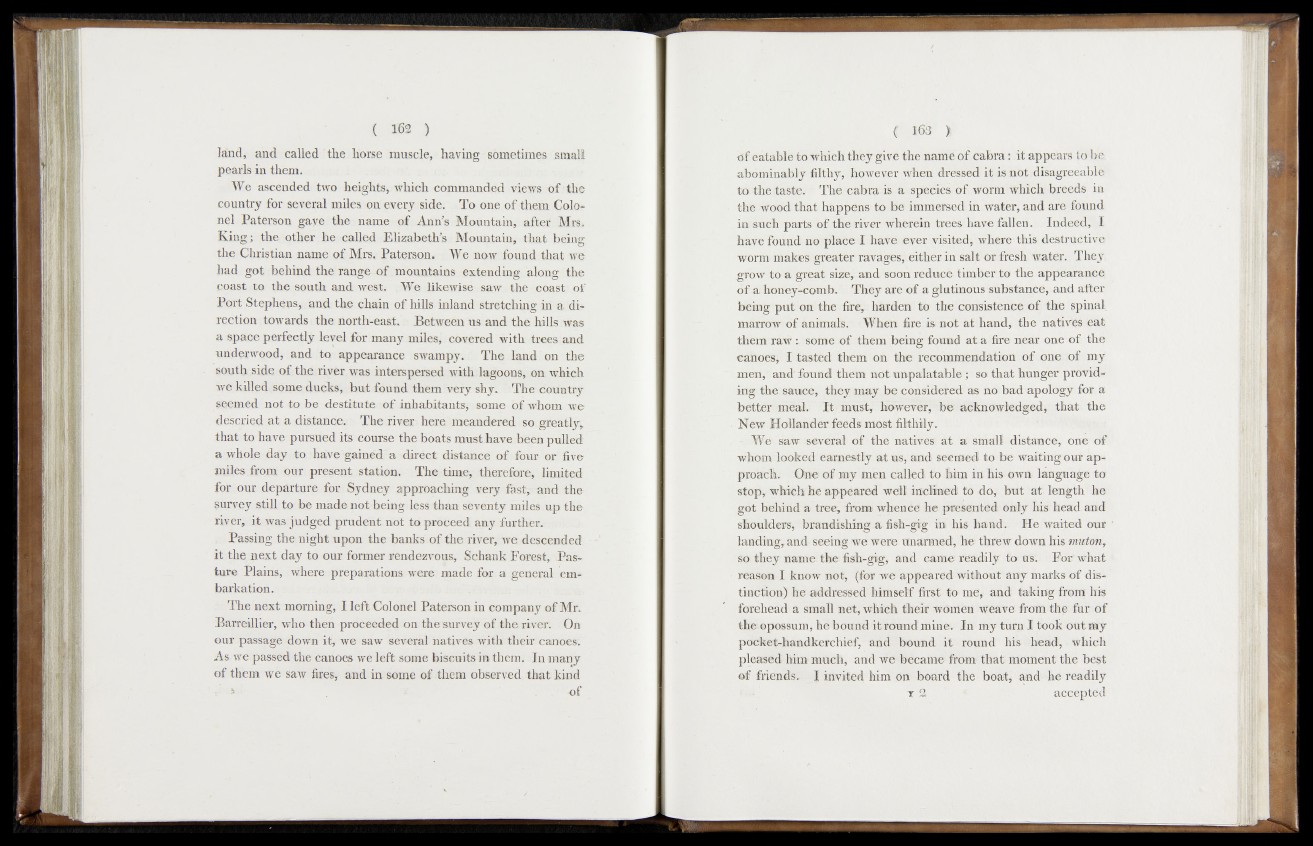
{ IBS )
land, and called the. horse muscle, having sometimes small
pearls in them.
We ascended two heights* which commanded views o f1 the
country for several miles on every side. To one of theha Colo*
nql Paterson gaye the name of Ann’s Mountain, after Mrs.
Kingj the other he called iHi^abeth’s Momtón, tha t being
the Christian name of Mrs, Paterson. We now found that we
had g o t; behind the raage-of moua^ins extending along the
poast to the south and weat, We Hkewise sawv Ae c o a s to f
Port Stephens* | arid: the chain of lulls inland stretching in a db
rection towards : the north-east.. JBetween us and the hills .was
a space perfectly level lor many milea* covered withi tseesjand
underwood, and to appearance swampy. The land on the
south side ofe the, river. was interspersed with, lagoons, on which
we hilled« sótnecduêhsi but found them very shyt r The country
Seemed not to be destitute of inhahitaxits, some of whom we
doseped a t a distance. The river here meandered so. greatly,
that to have-pursued its course the boats must have been pulled
a whole day to. have gained a d irë c t distance of four or five
miles from Our present station. The liane, therefore, limited
jhf Tour departure for Sydney approaching very #st* and th #
survey still to be made not being less than seventy miles up thé
rivea* it was judged prudent, not to proceed any fortiteife r<-
. Passing the night upon the banks of±heriver,we descended
it fhfcnoxt day to our former rendezvous, Schank Forest, dPas.*
hire Plains, where .preparations were made for a general em>
barkation.
: The next morning, I left Colonel Paterson in company of Mr.
Barreillter, who then proceeded on the survey of the riven On
ea r passage down it, we saw several natives with their canoes:
As we.passed! the canoes wé left some biscuits in them. In many
of them we saw fires, and in some of them observed tha t kind
g i . . -Of
i m J
of eâtaMÔf o which thëÿ give the name of cabra : i t appears to be;
abominably filthy, however when dressed it is not.disagreeable
to the-taste. The cabra is a sptecies. of worm which breeds in
the woodthat happens to be immersed in water* and are found
in such parts of the river whbrein trees have fallen, Indeed, I
haveforiud no place I have -stmt,: visited, where' this destructive
worm makes greater ravages,: either in salt or fresh water. They.
gfoeMtjMa. great size, and soon rednoèï timber to the appCarancei
Of a honey-comb. They aie of a gl utinous subsiance, and after
being put on the fire, harden to the consistence of the spinal,
marrow o f animals. When fire is not at hand* # e natives teat
them raw some Of them being found at a fire near one ©f the
canoes, I tasted them on the recommendation o fo n e of -my
men, and* found them not unpalatable ; so that hunger providing
the sauice, they may be considered as no bad apology for a
better meal. I t must, however, bo acknowledged, that the
Mew Hollander feedsmost filthily.
- We saw several of the natives; at a small distance,, one of
whom looked earnestly at ms, and seemed to be waiting our approach.
One of nay men called to him in Ms- ©wri language to
stop, wMeb he appeared well inchated to d o / but at length he
got behind a tree, from whence be presented ©nlyhis; head and
shoulders, brandishing a fish-gig in his hand. He waited our
landing, âitd- scserng we were unarmed, h© threw down Iris mama,
so tliey name the fish-gig, and came readily fo us. For what
reason I know not, (for we appeared without any marksdf distinction)
he addressed himself first to me, and taking from bis
forehead a small net, which their women weave from the fur of
theopossum, he bound it round mine. In my torn I took out my
pocket-handkerchief, and bound it round his head, which
pleased him much, and we became from th a t moment the best
of friends. J invited Mm on board lie bom, t o d fie readily
r 2 v accepted